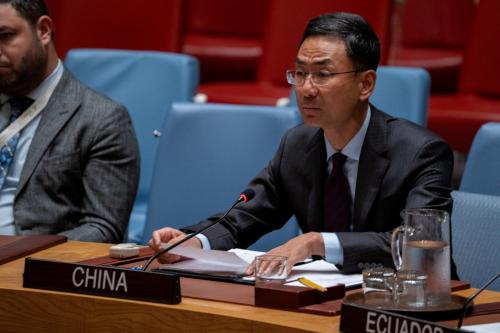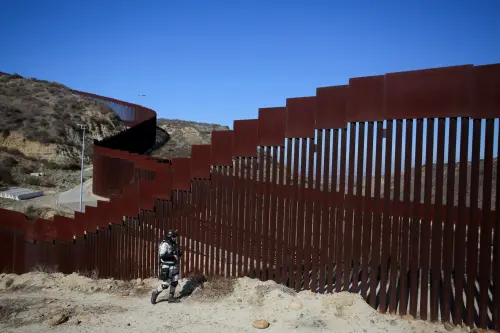On February 18, President Barack Obama signed the North Korea Sanctions and Policy Enhancement Act (H.R. 757) into law in response to the North Korean (DPRK) nuclear test in January and rocket launch in February. The law strengthens U.S. sanctions against North Korea by making it mandatory, not just discretionary, for the president to designate violating entities for sanctions. It grants substantial tools for employing secondary sanctions by requiring the U.S. Treasury to determine if North Korea is a “primary money laundering concern.” North Korean minerals and metals exports are especially targeted as potential sources of revenue that would feed the nuclear and missile programs.
Meanwhile, the United Nations Security Council (UNSC) is finalizing its fifth set of sanctions against the DPRK, which is also expected to be stronger and more comprehensive than past versions. Member states will be expected to conduct mandatory inspections of all cargo to or from North Korea, prohibit the sale of small arms and other conventional weapons to North Korea, and impose an unprecedented ban on all shipments or items that contribute to North Korea’s armed forces. After nearly two months of intense negotiations and international pressures, China seems to be willing to work with the United States to strengthen sanctions, but practical implementation and enforcement remain open questions.
Accumulated sanctions have made it harder for North Korea to pursue its nuclear ambitions by revealing how Pyongyang acquires and transports materials from abroad. The Ocean Maritime Management Company (a North Korean shipping firm), for example, has brought arms and related material into the DPRK and outmaneuvered sanctions by registering ships illegally, changing their flags, and buying foreign crew. The sanctions also effectively forced the country out of the international financial system.
However, as the “hydrogen” bomb testing and subsequent rocket launch have shown, sanctions have failed to thwart North Korea’s nuclear ambitions and illicit actions. So, why haven’t sanctions been enough?
It’s China, but not just China
The U.N. Panel of Experts (PoE) report is clear that North Korea has figured out effective ways to evade sanctions. The report also cites the low level of implementation by member states and attributes this to the “lack of political will,” “low prioritization,” and/or inadequate understanding of the sanctions regime.
It is common knowledge that Chinese businesses facilitate North Korea’s nuclear ambitions and have been largely unaffected by U.N. sanctions. The rule requiring consensus in the Security Council further complicates this situation, as China has repeatedly opposed designating Chinese entities—specifically those recommended by the Panel of Experts in the Resolution 1718 Sanctions Committee.
But China alone is not to blame. Smaller member states face implementation challenges because they often lack awareness or even the capacity to enforce sanctions. Recent reports of a number of African countries conducting arms deals with North Korea shed light on this challenge. They include Uganda, Zimbabwe, Nigeria, Tanzania, Ethiopia, and the Democratic Republic of Congo. Often, developing countries place low or no priority on global agenda items such as nonproliferation. Meanwhile, they tend to capitalize on cheap and easy ways to purchase, maintain, and upgrade outdated military equipment and to train military and police personnel.
North Korea has diverse diplomatic relations around the world. The significant presence of North Korean “diplomatic personnel” in many countries can be transformed into an intricate network of illicit deals. The Security Council is aware that North Korean diplomats have been suspected of carrying forbidden goods or cash, and has asked member states via UNSC Resolution 2094 (in 2013) to exercise “enhanced vigilance” over North Korean personnel.
The perils of strategic patience
The Banco Delta Asia (BDA) case is often hailed as one of the most effective measures against North Korea when it was employed during the six-party talks. A key factor at the time was North Korea’s placement of many of their foreign exchange holdings in the BDA account. But this sanction’s effectiveness was short-lived. By virtually expelling the DPRK from the global economy, the sanctions forced Pyongyang to find new ways to evade formal transactions. They developed other ways to do business through illicit cash-flow networks and the use of intermediaries.
With the recent enactment of the H.R. 757 in the United States, many are curious as to the impact that secondary financial sanctions will have on foreign businesses, since third-party individuals or entities conducting business with North Korea can be targeted. This can be interpreted as Washington’s push to pressure Chinese businesses that serve as enablers. Yet, as Stephen Haggard of the University of California at San Diego reminds us, the impact of secondary sanctions will rest on the Treasury Department’s ability to identify those foreign businesses holding key North Korean assets. Moreover, the sanctions will only be effective if those suspected entities have ties to the U.S. financial system. And some Chinese banks have managed to remain profitable in spite of a U.S. Treasury designation.
The United States must acknowledge that its own confines of strategic patience have only emboldened the Kim regime.
Given the serious doubts about the effectiveness of sanctions, U.S. policymakers should devise a course of action that can be undertaken in tandem with sanctions. But Washington’s own dilemma lies in the paucity of options and the recalcitrant mantra of a conditions-based approach to diplomacy. The United States must acknowledge that its own confines of strategic patience have only emboldened the Kim regime. The painful truth is that sanctions alone have proven to be insufficient to physically prevent the transfer of materials and technologies, or to force the regime’s top brass to rethink their nuclear ambitions. We are now farther away from achieving a denuclearized peninsula than we were a decade ago.
Sanctions are not strategy
The most important requirement to making sanctions effective is missing in Washington and the United Nations: a strategy with clear goals, benchmarks, long-term diplomatic roadmap, and negotiable items.
Are the U.N. and U.S. sanctions aimed at modifying Pyongyang’s behavior, specifically slowing down the DPRK’s ability to obtain the funds and materials for the nuclear and missile programs? Yes. Do the cooperating states have a shared benchmark for a satisfactory “slowing down”? No. Do they have a shared timeline for enforcing and sustaining the sanctions? No. China’s goal is shorter-term, to prevent the United States and South Korea from installing THADD (U.S. missile defense system) on the peninsula, and from pushing North Korea too hard and to buy time to revive six-party talks.
We are now farther away from achieving a denuclearized peninsula than we were a decade ago.
For Beijing, the goal of sanctions is not regime change. But for the United States, South Korea, and Japan, an eventual regime change that ensues from sanctions would be welcome. The problem is that the U.N. and U.S. sanctions are not robust enough or targeted enough to achieve regime change. If they were, China and Russia would not sign on.
Sanctions sometimes are applied to push a state toward reorienting specific aspects of its domestic and foreign policy, whether to end apartheid (as in South Africa) or territorial expansionism (as with Russia in Ukraine). Are the current sanctions by the U.N. and the United States aimed at reorienting DPRK’s policy directions? Not really. Even if Pyongyang’s nuclear and missile programs were to slow due to sanctions, its desire for a potent deterrence against the United States, South Korea, and Japan remains strong, and the ambition to pursue its byungjin (military power and economic development) policy persists.
The United States and other concerned powers need to prioritize what the main components of a strategy toward the DPRK should be. For starters, Pyongyang needs to be persuaded that byungjin is a “have your cake and eat it too” notion that is not feasible in an impoverished, under-educated, technologically deficient, infrastructure-deprived society. The reality is a zero-sum game: The money and human resources expended on the nuclear and missile programs do indeed take away from economic development and improved living standards for the vast majority of 25 million North Koreans. Economists, rather than arms control experts, might be more effective in explaining this.
Are the current sanctions by the U.N. and the United States aimed at reorienting DPRK’s policy directions? Not really.
The very large task is conceptualizing whether reorienting Pyongyang’s interests and ambitions toward economic well-being and human development are possible. If so, then the relevant incentives need to be articulated, even with sanctions at play. If not, what are the risks the international community is willing to take to actualize regime change that is better than what we have with Kim Jong-un, not worse? And if a peace treaty with the DPRK is the ultimate goal for the United States, South Korea, and China, as recent “testing of the waters” suggest, then these countries and the United Nations need to lead others—including the DPRK—toward that end. Navigating that path is the most ambitious and complex in the short- to mid-term, but probably yields the most constructive and resolute outcome: a more peaceful East Asia region.
Meghan O’Sullivan of Harvard University emphasizes that sanctions must serve as instruments of a cohesive strategy, as in the case of the United States’ broader strategy toward Vietnam that included sanctions as one component along with economic incentives and a long-term roadmap toward diplomatic normalization.
Before we lose an additional 10 years, Washington and the U.N. must develop a cohesive, clearer strategy toward North Korea. Otherwise, we’ll be going in and out of the revolving door of sanctions—again.
The Brookings Institution is committed to quality, independence, and impact.
We are supported by a diverse array of funders. In line with our values and policies, each Brookings publication represents the sole views of its author(s).



Commentary
Are sanctions enough to deal with North Korea?
March 2, 2016